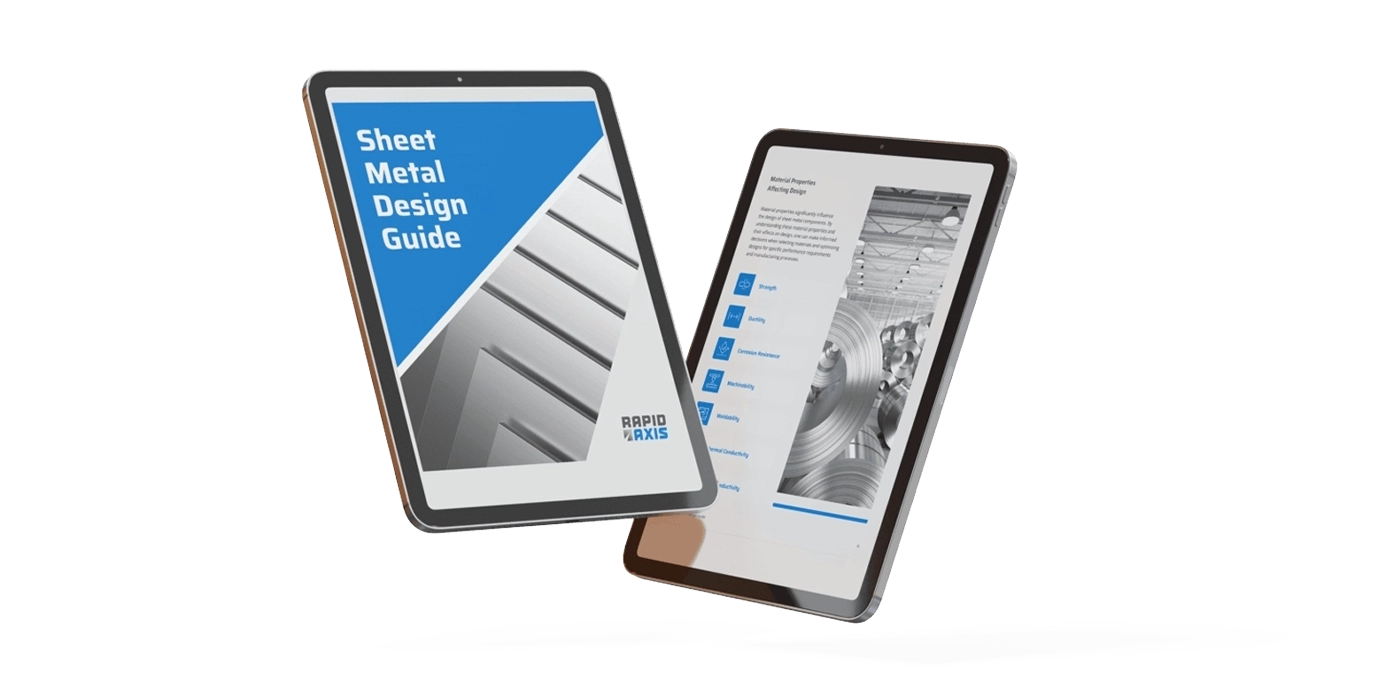Rapid Axis for Aluminum Sheet Metal Fabrication
Aluminum sheet metal fabrication is a quick way to get affordable, strong, lightweight parts in small or large quantities. At Rapid Axis, our aluminum fabrication covers a range of material options and finishing choices. We’ve created parts for many different industries and applications over the years, and we can help with your project, too.
Our expert machinists, high-quality machinery, and attention to detail set us apart from other machine shops. We do more under one roof so you can save time and money on each project. Our team can fabricate your most complicated and intricate aluminum sheet metal builds.




Why Choose Rapid Axis for Aluminum Sheet Metal Parts?
Aluminum is one of the more common materials we work with. Companies across industries and applications can appreciate the strength-to-weight ratio, formability, and versatility of aluminum sheet metal.
At Rapid Axis, we aim to exceed your expectations with each project. We go the extra mile to ensure the quality and turnaround times are exactly what you’re looking for. As a manufacturing partner, we want to help you create every part and assembly that you need.
Whether you’re making a heat-sensitive electronics housing or a load-bearing aerospace bracket, we can help. We look into the manufacturability of each part and can give you suggestions if we spot any DFM issues. This is why so many engineers and product teams across the country trust Rapid Axis.
With our waterjets, laser cutters, expert machinists, and forming machinery, trusting Rapid Axis for your aluminum sheet metal fabrication needs is a no-brainer.
Parts made to customer drawing tolerances
Quick lead times and service
Finishing and second operations supported
Available Materials
Aluminum comes in a variety of different alloys. Each alloy has a unique set of benefits and drawbacks, so it’s important to pick the right option for your next project. At Rapid Axis, we commonly work with four aluminum alloys.
6061 and 6061-T6 Aluminum Sheet
We do a lot of aluminum sheet metal fabrication using 6061 aluminum. This material is incredibly common and is strong enough to be used in aerospace and structural applications. The T6 identifier is a heat-treated version of the 6061 alloy — this makes the metal harder and a little tougher to work with but boosts the strength.
General 6061 is incredibly versatile, cost-effective, and great for general use.
5052 Aluminum Sheet
5052 aluminum is another common option, especially with sheet metal projects. It has better formability and incredible corrosion resistance, as well as high fatigue strength. You can use this alloy in harsh environments, which is why industrial and maritime companies will usually default to 5052 alum.
3003 Aluminum Sheet
3003 aluminum sheets have a nice balance of cost-effectiveness, corrosion resistance, and ease of manufacturing. You’ll see it used a lot in HVAC systems and signage. It’s not as strong as other alloys, so it is largely reserved for parts that are not load-bearing.
7075 Aluminum Sheet
7075 is a more specialized alloy that has an improved strength-to-weight ratio. As a result, use 7075 in a lot of parts for aerospace, defense, and industrial applications. The corrosion resistance isn’t as great, but the added strength is worth it in most applications. Plus, you can use any number of finishes to help improve the corrosion resistance of 7075 aluminum parts.
Finishing Options
Speaking of finishing options, we offer a lot of options in-house. Other machine shops fall short when it comes to finishes, so this is another area where Rapid Axis stands out. With us, you can pick from a range of options for your aluminum sheet metal parts and assemblies:
Anodizing
Anodized aluminum sheets are very common, and it feels like we do some form of anodizing on a monthly basis. This is an electrochemical process that turns the surface of your parts into hard, corrosion-resistant surfaces. We also offer a few color options to further personalize your parts. This is a great choice for 7075 aluminum parts, since that alloy can have issues with corrosion in the long term.
Powder Coating
Powder coating involves adding a dry powder to your part and curing it under consistent heat to firmly bond the powder in place. In the end, you get a part with a tough exterior that can have a really colorful and vibrant finish.
This helps with wear resistance as well as branding or personalization of parts.
Brushed or Satin Finishing
With aluminum, we can apply a brushed or satin finish to change the aesthetic of the final part. This is done instead of a powder coating or anodizing film. This finish is great at hiding fingerprints and minor surface imperfections, which is great for parts that are touched a lot like kitchen appliances and different panels or enclosures.
Chemical Conversion Coating (Alodine)
An Alodine coating boosts the corrosion resistance of your part and can be the first step of a powder coating operation. This is another good option for 7075 aluminum parts, and we use it a lot in aerospace and military projects.
Another benefit of Alodine is that it preserves the electrical conductivity of aluminum, so it can be applied to connectors and control panels.
Custom Paint and Marking
We also offer a range of custom paint and marking options. This is used to brand your part or label units with specific instructions or warnings. Since these are custom offerings, reach out to us to discuss specifics.
Key Features
Aluminum is one of the most common metals used in commercial, consumer, and industrial applications. It should be no surprise that there are a lot of major benefits of using aluminum:
- High Strength-to-Weight Ratio. As a material, aluminum has an incredible strength-to-weight ratio. It can handle heavy loads without adding too much weight to your assembly.
- Excellent Corrosion Resistance. Aluminum is naturally corrosion-resistant, and it can be further improved by using the right alloy or finishing option.
- Thermal and Electrical Conductivity. Aluminum is a great choice for electronics housings or heat dissipation systems.
- Formability and Weldability. One reason why aluminum sheet metal fabrication is so common is because the material is easy to work with, bend, weld, and machine.
- Recyclability. As an added bonus, most aluminum parts are highly recyclable, which makes them an environmentally-friendly option.
General Restrictions
There are also a few considerations to keep in mind before fabricating your next aluminum part:
- Tolerances. We can typically offer tolerances between ± 0.005” and 0.010”, which is fine for a majority of projects. If you need tighter tolerancing, reach out to us to discuss more specifics about your project.
- Max Part Size. Our laser cutters and brakes can accommodate parts up to 120″ x 60″ in size.
- Thermal Expansion. Heat causes aluminum to expand, so you’ll need to do some extra calculations or simulations if your part will go through thermal cycling.
Applications
We’ve made so many sheet metal parts and assemblies out of aluminum that we’ve lost track. Since this material is so versatile, you can find examples of its use across industries and applications.
Automotive
A ton of car parts are made out of aluminum. You might use it for anything from bodywork to framework and brackets.
Aerospace
Aerospace projects will use aluminum when they need a lightweight way to support parts, such as seat frames and interior panels.
Electronics and Electrical
Since aluminum has great electrical conductivity, it can be used in enclosures and heat sinks.
Consumer Products
Plenty of consumer products use aluminum since it’s lightweight, easy to machine, and cost-effective. You can aluminum sheet metal for the exterior of kitchen appliances, beverage cans, and furniture frames.
Industrial Machinery
Aluminum sheet metal is commonly used as structural framing, safety guards, and access panels on industrial machines.

